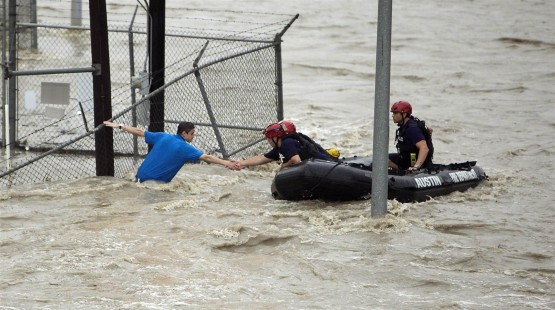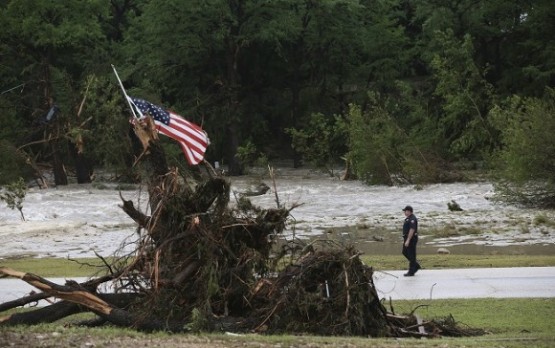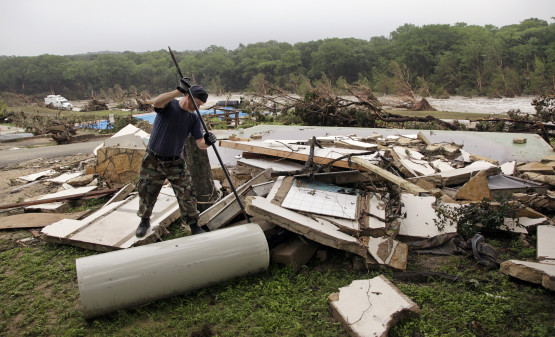Monthly Archives: May 2015
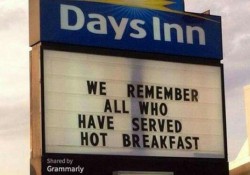 Students attempting to strip a state senator of his college degree for skepticism of global warming were unsuccessful.
Students attempting to strip a state senator of his college degree for skepticism of global warming were unsuccessful.
Ronald Nelson, a Memphis high school student, was accepted into every Ivy League school. He chose the University of Alabama.
Carols Lozada explains why conservatives give better commencement addresses than liberals.
States (like Connecticut) are often looking for a good excuse to go after homeschooling parents, and some Michigan legislators think they may have found one, and combined with recent events in North Carolina and revelations in Arkansas leave me concerned that “We need to crack down on homeschooling so the government can keep a closer eye on kids” is going to be a more oft-used argument.
Sady Doyle argues that interconnectivity and branding is ruining the Marvel popcorn movies.
I find this “Startup Castle” – with rules for residents covering everything from tattoos to exercise – to be intriguing. Though very much in a “not for me” way.
Freddie really put his finger on what sometimes causes me discomfort with the way that some people gush of Ta-Nehisi Coates.
David Lynch is back on board Twin Peaks.
AdultFriendFinder.com has been hacked. If exposed, divorces likely to follow…
A Mormon Temple in West LA is letting its lawn go brown. Brown lawns have a bad rap.
I don’t object to swapping out Andrew Jackson’s mug from our $20, or with Harriet Tubman being on a bill (or coin), though I am hoping that we hold out for a currency overhaul.
According to a new lawsuit, a veteran committed suicide after being given a terminal misdiagnosis by the VA. Also in Arizona, a suicide with a message, in front of a VA hospital.
Sometimes, compared to the alternatives in oil transportation, Pipelines aren’t so bad.
Chicago’s bond rating is now junk.
California farmers are starting to see the writing on the wall, and are offering to cut water usage by 25%.
Reddit users may be wondering “How did Cameron win? Nobody I know voted for him.”
Martin O’Malley is trying to suss out his position the The War… of 1812.
SurveyMonkey correctly called the UK election that others missed. Their different methodology could prove to be very important at cutting through American equivalents of Shy Tory and partisan weighing. Also, the importance of presidential non-candidate Emily Farris.
Obaman-turn-Tory (not quite) Jim Messina has some advice and warnings for the GOP. While most free advice from people who would never vote for your party is worth exactly what you pay for it, Marco Rubio should pin this on his wall.
Robert E. Kelly says that the Obama administration, like Japan, is getting tired of South Korea’s fixation on past wrongs.
The river came up past the magnolia tree
The swore we were three feet above the flood plane
Thank You, Lord, but we don’t need any more rain.
The sun won’t be shining any time soon
The ground swelling up like a water balloon
We got to find us a dry place to stay
Let’s hurry, before we all wash away
God bless our children, god bless this town
God keep the looters from coming around
Bless the hungry, the thirsy
But if it’s all the same
Thank You, Lord, but we don’t need any more rain
Gather the pictures, there isn’t much time
The man from the TV, he ain’t easin’ my mind
Eleven more inches? Is that what he said?
Someone grab the box print of Jesus hanging over the bed
God bless our children, god bless this town
God keep the looters from coming around
Bless the hungry, the thirsy
But if it’s all the same
Thank You, Lord, but we don’t need any more rain
There’s a chair in the treetops, a stove in the field
This time it was rough, I don’t think we’ll rebuild
I hate to see this old house meet its end
Sometimes it’s best startin’ over again
God bless our children, god bless this town
God keep the looters from coming around
Bless the hungry, the thirsy
But if it’s all the same
Thank You, Lord, but we don’t need any more rain
God bless our children, god bless this town
God keep the looters from coming around
Bless the hungry, the thirsy
But if it’s all the same
Thank You, Lord, but we don’t need any more rain
“Rhonda’s Prayer”
Dead End Angels
Written by Scott Melott
1. Always write with absolute conviction; the internet is no place for doubt or uncertainty. The idiots on the other side may think you’re wrong, but your list of cherry-picked authorities verify your brilliance by their agreement with you.
2. Everything is a team issue. Ev–ree–thang. For example, 90% of conservatives who are not Indianapolis Colts fans think Tom Brady got a raw deal, and liberals are all pussies who don’t like sports anyway. Also, only liberals understand the pervasiveness of patriarchy, while 99% of conservatives think rape is a myth and have probably raped someone themselves.
3. Simplify. No issue is actually complex or hard to understand if you just leave out the inconvenient details and give it a meaningful structure like “3 Simple Tips for Being a Successful Internet Writer.”
Kavitha Davidson writes about the NFL holding San Diego hostage as they try to extort a football stadium out of the city. The threat, of course, is Los Angeles.
The fight over a new team in Los Angeles shows that teams are incredibly calculated in their strategy of holding their existing cities hostage. The Chargers, Oakland Raiders, and St. Louis Rams are all competing for the chance to move to Los Angeles, or at least publicly threatening to do so to see just how much they can squeeze out of their local governments. And they’re getting a boost from their compadres at other organizations, with various owners stating that football in Los Angeles is a foregone conclusion. “It’s not a matter of ‘if’ now, but ‘when,’ ” Indianapolis Colts owner Jim Irsay told the San Francisco Chronicle. San Francisco 49ers chief executive Jed York explained that the franchises’ current cities haven’t made enough of an offer to keep their teams in town. “I think L.A. is much further along than any of the home markets at this point,” he said.
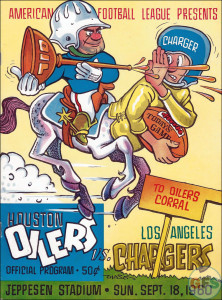 The quirky thing here is that all three teams used to play in Los Angeles, though the Chargers for only one season. The particularly funny thing about the Chargers were the leading voice to keep an NFL team out of Los Angeles the last expansion. They wanted Southern California to themselves. Houston, instead of LA, got the team. There’s a good chance if Houston hadn’t gotten the team they would simply be threatening to move the programs to Houston instead of Los Angeles, but Houston is a bit less threatening in that regard.
The quirky thing here is that all three teams used to play in Los Angeles, though the Chargers for only one season. The particularly funny thing about the Chargers were the leading voice to keep an NFL team out of Los Angeles the last expansion. They wanted Southern California to themselves. Houston, instead of LA, got the team. There’s a good chance if Houston hadn’t gotten the team they would simply be threatening to move the programs to Houston instead of Los Angeles, but Houston is a bit less threatening in that regard.
What is so ridiculous about this is that the NFL is acting like there is some market force at play here. As though it is some natural state of affair that there be 32 football teams. The threat of Los Angeles only exists because they won’t expand. There really isn’t much doubt that St Louis, Oakland, and San Diego have the fan base to support a team. There’s really no reason that they can’t all have a team, along with Los Angeles and maybe San Antonio, and everybody’s happy. Except, of course, not everybody’s happy, because the billionaires want a new stadium, and would prefer not split the money more ways than they have to (this is where the NFL’s pinko-commie model is a hindrance).
The population has grown, but the number of NFL teams haven’t. There are fewer teams per-capita than there have been since the NFL-AFL merger in 1970. As of a few years ago, when I had a handy spreadsheet, there were between 7-10 cities (depending on things like whether you count San Jose as a new market) that are larger than the five smallest existing markets. Plus, New York could hold a new team (imagine a New York team that actually played in New York!). They could expand to as many as 40 teams and still not be overextended. Expanding by two, or even four, doesn’t strike me as reaching too hard. You wouldn’t even have to go to London.
I’ve actually come around to the notion that it might actually be something less than ridiculous that cities are footing the bill for stadiums for billionaires. I think there is a logic to it, just as there can be a logic to paying off any extortionist. The problem is the extortionist, and that congress let’s them do this and keep their broadcast anti-trust exemption. There is a screw there to be tightened, if they were so inclined.
In other news, the NFL is going to be making the extra point more difficult, by requiring that it be kicked from the 15 yard line. Benjamin Morris of 538 says that it won’t actually be that much harder, while James Brady is citing safety concerns.
Personally, what I don’t like about it is that it removes fakes from the equation, more or less. It basically requires teams to declare whether they will be converting or kicking. Fakes are one of the few interesting things that happen during PAT’s.
What I would personally like to see is a third option. They can kick a PAT from the 15, they can go for a 2-point conversion from the 2-point spot, or they can go for X-points by trying to score from the fifteen. X would need to be determined mathematically, but I’m figuring about four points. It would definitely make things more interesting if a team could score 10 points on a single drive, and we wouldn’t know exactly what they were doing when they line up at the 15.
 The officer in the photo to the right was reprimanded for it.
The officer in the photo to the right was reprimanded for it.
Jessi Strieb wrote a book on cross-class marriages, and here’s an interview.
Here’s a map of all of the places Willie Nelson sings about. I want to see one for Counting Crows, which include a lot of songs about some person in some city who is sad and dispossessed.
Millenials are flocking to the suburbs.
But only certain types, says Jordan Weissman. There are class implications, because educated millenials are still moving to the city. Personally, I would guess this is a function of family formation as much as inequality.
Are they being driven to home ownership by rising rents?
More on the exurban revival.
The curse of the lottery winner may be overstated.
Benjamin Schwarz argues that urban planners are demolishing Britain’s working families.
Sayeth the Department of Energy: Drill, Baby, Drill.
The Guardian has a couple of articles on the privitization and gating of cities.
This will not only add economic efficiency to consumer products, but will be great for those of us who are allergic to waste.
I’ve been going back and forth on whether or not to do a post on the Duggars. Mike Rice’s submission on Duggar vs Dunham has pushed me towards doing so. My thoughts don’t quite track with the fiercest critics and defenders of the Duggars, though on the whole are more sympathetic to the former rather than the latter view. This is actually expanded upon from a comment I left on Facebook.
—
I have a weird capacity to be able to understand and, while definitely not condone or less pass, at least empathize a bit with some pretty amoral and immoral stuff. What sometimes gets me, though, is the combination of immoral (or amoral) and reckless.
Some argue whether or not we should extend or do away with statutes of limitations when it comes to sex crimes, but regardless most of us should think twice about holding a 14 year old indefinitely accountable for their actions at that age. We shouldn’t do it for murderers, and we shouldn’t do it for rapists. Thoughts contrary to this sometimes posit that sex crimes are particularly noteworthy because of recidivism, but that’s the same mentality that have given us our inhumane sex offender registries and the like. And in the case of Josh Duggar, it’s not clear that charges would be pursued anyway.
While I cannot quite condone the actions of Jim Bob Duggar in covering up the crime, I can certainly understand them and cannot say that in his shoes, I would do anything differently. Nobody wants their kids to go to jail even if they’re out at 18. Some – with more knowledge of the system than I have – say that treatment would likely be the recourse rather than prison. I don’t know if that’s true, and notably neither did the Duggars. An imperfect handling of the situation is understandable.
And faith is a thing that… well, it’s a thing. It doesn’t go away if you’re a sinner, and for all we know this has been weighing heavily on Jim Bob and Josh for a very long time. The events here have been used to try to argue against their faith or their church, but the case against the former seems rather weak to me. The same goes with ideology, up to a point. A writer for the Daily Beast said something to the effect of “It’s always the right-wing conservatives…” and was quickly presented with an army of counter-evidence. There’s still room to talk about how subcultures deal with sexual violation, however, but we should be wary of using a really broad stroke if we don’t want to get into conversations about how multiculturalism encourages us to look the other way.
The particulars of the subculture to which the Duggars belonged are more damning, however. and this is where things start getting more tenuous. Jim Bob Duggar’s church appears to have long-been comprised of people who tolerated outrageous sexual abuse (and it’s not just that guy). For a father with daughters to be able to look at that with a blind eye, does not lend itself to much in the way of the benefit of the doubt when it comes to other sexual violation of girls. It appears that there were serious problems here, and Jim Bob was more than happy to look the other way in the interest of spiritual morality.
The combination of these things, though, paint a darker picture. And the next bit puts me over the edge: If Jim Bob Duggar truly appreciated the gravity of the situation, and put his family first, he would not have gone the moralizing celebrity route. This isn’t about disagreeing with his views on homosexuality or sexuality more general. This is about disagreeing, in the strongest possible terms, to appointing himself a messenger for these things. Putting yourself in the limelight carries with it risks. Harboring dark secrets means that you don’t get to be a celebrity. You don’t get to draw attention to yourself. You don’t get to run for public office. You are rather obligated, for the sake of your family and keeping the secret that would devestate it, to keep your head low, provide for your family, and not make yourself a target (by, for instance, stating views that would have people opening every closet of your life in search of skeletons).
That Jim Bob didn’t do this, to me, speaks volumes. It tells me that he either didn’t understand the gravity of the situation, or was willing to put his family at risk for the cause of self-glory. It’s the thing that I really cannot find it within myself to cut him slack on, and it by extension colors my view of anything and everything else his family has done. The same applies to Josh, to a lesser degree, who risked his family’s standing and privacy by making himself a target with the Family Research Council and following in his father’s footsteps. Some of that can be attributable to his raising, which leads straight back to the head of his household.
In the end, to me, it all comes back to Jim Bob.
In September 2014 Lena Dunham’s memoir Not That Kind of Girl was released. In it, she talks of molesting her younger sister. There was some minor negative commentary, but Dunham was defiant, and seems to have suffered no loss of popularity because of it, and her show Girls was renewed in January.
It has come to the public’s attention that Josh Duggar, the oldest child on 19 Kids and Counting, molested 5 girls when he was a teenager, 4 of whom are his sisters. In contrast to the mild reaction to Dunham, a firestorm has erupted over Duggar. TLC has currently decided to suspend its airing of the shower.
These stories seem similar to me, yet there is a big difference in the public reaction. The question is: why? One possible reason is that Dunham is a woman, while Duggar is a man. It seems more wrong and predatory when a boy explores his curiosity with his younger sisters than when a girl does it.
However, I think it is more than that. I think the reason for the differing public reactions is that Dunham is “cool” and Duggar isn’t. Since Dunham is cool, any great criticism of her is going to make the critic seem uncool. However, since Duggar and his family are seen as weird, any criticism of him is going to be safe. As much as people cry about “punching down” people seem to enjoy it when it comes to Duggar.
Also, Duggar’s politics and his religious beliefs are far out of the mainstream, and he has actively worked against the expansion of LGBTQ rights. Since they are the current favored minority, people are going to do anything they can in order to poke a hole in Duggar’s credibility.
Duggar did these things as a minor. There is a reason why juvenile police records are sealed. The fact that these reports were redacted so cavalierly is a major concern to me. Duggar apologized to those he hurt, and he told his wife before they were married, and she still married him. It really isn’t anyone else’s business. Dunham put it in her memoir in order to make money from her molestation; Duggar was forced to talk about it publicly.
I have never watched 19 Kids and Counting, or Girls for that matter, so I have no vested interest in either show airing or not. I am only writing this post because the hypocrisy that people are showing is troubling. I wish I could say it was surprising, too…
In 1903, workers at the World Smelter struck for an 8-hour day. The World Smelter was owned by the Trumanverse Smelting and Refining Company (TSARCO) and was located in Worldville, a neighborhood in Danvar, the capital of Cibolia. TSARCO used strikebreakers, from Worldville, from other parts of Danvar, or from other states. By September, the smelters were running again, but the union did not officially call off the strike until spring 1905.
At least two incidents of labor violence occurred during the strike. The first came in November 1903. As replacement workers walked to the smelter, wives of some of the strikers attacked them. They threw red pepper into their eyes and temporarily blinded them. The second incident came sometime in 1904. Someone set off dynamite outside the home of a skilled smelter worker who lived in Worldville. The dynamite shattered the worker’s windows, but otherwise left the inhabitants unscathed.
I wrote my masters thesis about that strike and another one at the same smelter that occurred in 1899. I interpreted the violence differently then than I do now. Neither interpretation is without its problems.
Then: I mostly gainsaid the violence. It was a violent time for union supporters elsewhere in Cibolia. In 1903, the governor had launched a campaign against the Occidental Federation of Miners (OFM), with which the smelter union was affiliated. The OFM had effectively controlled labor relations in the state’s gold and silver mines for about 10 years. The governor used state militia not only to protect replacement workers, but also to intimidate and arrest union supporters on trumped up vagrancy and other charges. He also turned a blind eye to vigilante groups, called “Citizens’ Alliances,” that harassed and deported miners out of the state. The smelter union’s strike was a sideshow to this larger campaign, and Danvar was a different place. But if that union also resorted to violence, I reasoned, the bigger picture made the resort seem less unjustified.
Second, the violence was not so bad because the harms were “mild.” The victims of the pepper spray attack were blinded, but “only temporarily.” The skilled worker’s house was bombed, but the evidence that unionists were responsible was unclear. Also, it was generally conceded in the news accounts, even in those papers not particularly sympathetic to the union, that the dynamite was so placed that the resulting explosion would not harm anyone. Therefore, the bombing was “only” a threat, and not actual harm aside from a few shattered windows. It’s also possible that the explosion was prompted by something other than the labor dispute because the evidence was too scanty.
Now: I’m much more concerned about how violence operated against those strikebreakers and more particularly, how much unionization at that time depended on the threat of violence. I’m more inclined to find reasons to criticize the violence and much more wary of invoking the “community norms” that helped sustain such violence as some sort of justification. I personally would be quite scared if someone blew dynamite outside my apartment even if the explosion “only” destroyed my windows. The damage from the red pepper may not have been permanent, but must have been painful. (Last night, I made for the first time what is called “green chili,” a dish I’ve never had outside of Cibolia and that I get homesick for. I got jalapeno seeds on my fingers and they burned for a couple hours. Good thing I didn’t touch my eyes.)
Still, I’d have to concede the points I made above. It was a violent time in Cibolia (and in generally). And the harms, while nothing to sneeze at, did fall short of more severe violence.
One answer to these different ways of telling the story is is to analyze what happened and refer to how it supports or contradicts existing studies in labor history and history of the era. That’s what historians do. And many, not all, historians like to say, “it’s not the historian’s job to judge, but to analyze the context and the patterns, and understand why things happened as they did.”
That admonition is sometimes used against Marxist-leaning leaning historians like me in 2000 that tried to find a common class-interest among people I knew only through contemporary news accounts and a few other sources. That same admonition could be used against the neoliberal-leaning me in 2015 who tries to find an individualized interest labor market participation. I’m actually compelled, based on the evidence before me (which is the same as 165years ago), that there was something like a class-interest in Worldville. And despite my now strong preference for the liberal presumption, I can’t fully deny this class-based, communitarian sense existed and was part of a reality that would not recognize the policies I support now or the reasons I support them.
 Texas is moving to become the newest state to allow terminally ill patients the ability to try non-FDA approved medications.
Texas is moving to become the newest state to allow terminally ill patients the ability to try non-FDA approved medications.
This story, of a Jewish student who was arrested for posting an image of a swastika he’d gotten while in India, raises some interesting questions about iconography and context. Leaving aside freedom of speech (ie even if we assume the legal right is there), are there words and images so offensive that there is no context in which they can be acceptably reproduced?
The DC Cinematic Universe looks like a real trainwreck. Bizarrely so, in my view, given that all they had to do was hire Paul Dini.
Dear DC Comics, cut this $#!+ out, please.
It feels a bit like corporations are going out of their way to make H1-B visas look bad, but the reality is that they have little reason to care about public opinion. More from Dave Schuler.
At CATO, Jason Kuznicki argues that property rights matter more for the poor than the wealthy.
Jeb Bush supports Puerto Rican statehood, but I have to agree with the National Review that it’s not presently a good idea for anybody involved.
Our wild 1,500 to be a barber.”>very regulated west.
Lydia DePillis looks at Puerto Rico to see what a massive minimum wage hike to $12 will do, because they had a hefty rise from $2.03 to to $3.35. It tries to explain away a whopping 9% drop in employment (Might have happened anyway!) and emigration (It’s good for people to leave!) and despite admitting at the end that raising the minimum wage didn’t do its economy much good. Despite an optimistic tone, it does little to alleviate my concern about what a $12 minimum wage would do to Mississippi.
The territory is raising its taxes to settle a budgetary shortfall, but Ike Brannan of the Weekly Standard argues that it should be allowed to declare bankruptcy. Jeb Bush wants statehood, but while that would fix the “can’t declare bankruptcy problem, I have to agree with the National Review that it’s not presently a good idea for anybody involved.
When should men wear short pants?
There’s something wrong with David Brooks.
Joe Battenfield argues that if things don’t work out with Hillary Clinton, the Democrats can always go with Kerry. Before Mitt announced he wasn’t running, I was pondering the violently (if unlikely) dull prospect of a Kerry-Romney election.
Muslim shopkeepers in China are being required to sell alcohol and cigarettes.
Conservatarian values collide on the question of guns and employment. Specifically, a Tennessee law that would bar employers from taking action against employees who bring a gun to their work place. There was a law passed that allowed people to legally take their guns on to others’ property as long as they kept it in their car. The law was amended to prevent employers from firing employees for doing this.
Dustin Siggins and Doug Mataconis argue that the law goes too far because it infringes on the property rights of the employer. Jazz Shaw argues:
There is also the question of where the employer’s “property” ends, which Dustin correctly notes in his piece. True, the parking lot is the property of the employer, but does that make the employee’s automobile their property as well? You either allow employees to park in your parking lot or you don’t. What they have in their cars – assuming it’s legal – is really their business if it’s not being brought into the workplace and potentially affecting the owners and staff. In a parallel case, many employers with security concerns do not allow workers to bring their cell phones into the office because of the camera and audio recording capabilities of modern phones. But they pretty much universally allow the workers to lock them in their cars while at the office. And most importantly, that scenario applies to a device which isn’t even covered by your constitutional rights.
This law seems to me to have been a good compromise. The employer can bar carrying weapons in the workplace, but the employee’s car is not the workplace. And punishing them for such storage is an unreasonable burden on their constitutional rights.
On the property rights question, I am actually squarely on Shaw’s side. When I was substitute teaching, I was technically violating city law and school policy because brought tobacco on to the premises. However, my belief is that since it stayed in the car, it was more on my own property than theirs until or unless I took it out of the car. (Which, also technically I did, but only to transport it off school grounds so that I could smoke, but we’ll forget that for a moment.)
The conflict to me is not between the Second Amendment and property rights, but the Second Amendment and the right of employers to hire and fire as they please. And here, I actually side with the employers. While I would criticize any employer who refused to hire people who (for instance) own guns at home, I don’t believe that gun ownership should be – at the current time – a protected class. If such policies become sufficiently widespread, then I might reconsider. Such policies are likely to be more widespread when it comes to “No guns in your car” policies, but the rationale for such a policy is notably more acute.
So my split-the-baby solution is that, given that Tennessee is an employment-at-will state, I would allow them to fire employees under the EAW doctrine. However, I would not view that particular reason for doing so as a “For Cause” firing. Meaning, the employee would be eligible for unemployment provided that at no point they presented a danger to anyone else (by either taking the gun out of the car, or threatening to).




